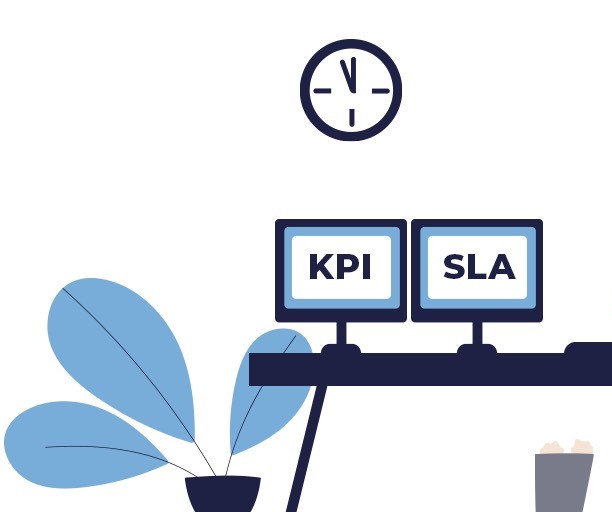
Service-Level Agreements (SLA) can add stars to your staffing partnership. Learn how:

Imagine if the above conversation happened between you and your staffing partner. After going through the rigorous process of selecting a staffing agency and onboarding them, you realize just a little into the partnership how their feeble service isn't backed by any concrete plan or metrics that would guide your strategic objectives – what a colossal waste of time and resources! Truth is, most of the staffing agencies have strong sales professionals who can “sell” their staffing services to you and convince you of their competence. But signing the contract with any agency while not knowing whether they will be able to ‘walk the talk’ or subsequently offer a scope for improvisation should they fail to deliver, is a huge risk and one your organization must avoid at all costs - pun intended. SO, HOW DO YOU AGREE ON A FOOL-PROOF STAFFING STRATEGY WITH YOUR PARTNER? The answer is simple - ask for a well-defined Service-Level Agreement (SLA) along with the RFP they submit. SLAs, a predominantly IT domain terminology, should be an integral part of any proposals received from potential service providers. It defines the minimum level of service quality that you should expect from your provider including the metrics to measure the service as well as alternatives to pursue in case of non-fulfillment of commitments. SLAs help to manage expectations in a clear and concise manner so that the service provider and service user have a similar understanding of the requirements. Due to the involvement of various functions in supporting outsourced staff, within the staffing industry, there are defined SLAs for each process of recruitment, employee care, payrolling as well as invoicing the client. Some key staffing SLA metrics to lookout for are TAT (Turn-Around-Time), AFRST (Average First Response Time) and Quality of CVs. Now let’s view this from the perspective of a strategist. For the sake of this blog, we’ll use the fictional example of Robin Smith, VP Human Resources at an electronics retailer based in the UAE with branches across the GCC.

Despite seeing growth during the lockdown, Robin was wary of hiring employees internally due to paucity of time and decided to go down the route of outsourcing staff for the 10 positions in the Head Office in UAE, and 20 sales promoters in Kuwait - emphasizing that all candidates be already present in the country. After multiple discussions with various staffing agencies across the region, Robin was able to decide on an agency which outlined the below: Sourcing candidates: a. From receipt of requisition: 3 days for submission of initial set of CVs for promoters b. From receipt of requisition: 10 days for submission of initial set of CVs for managers c. Robin’s feedback on the CVs to be sourced within a week from the date of CVs shared Scheduling interviews: a. Interview schedules set as per Robin’s availability within 5 days from receipt of feedback b. Robin’s feedback on interviews to be sourced within 2 days of each interview Selection of candidates: a. Offer letters to be dispatched on same day; TAT 100% Joining formalities: a. Cancellation request to be initiated based on last working day of the candidate; TAT 100% b. Reference check to be available in one week; TAT 97% c. Medical test applications for candidates within 7 working days; TAT 96% d. Visa stamping for all candidates to be completed within two weeks from receipt of passport Replacement guarantee: a. Replacement for candidates to be provided within 2 weeks Problem escalation procedure (PEP): a. Clearly defined problem escalation matrix so Robin knows who to contact first in case of any issues. Through these different processes, we see that SLAs are a two-way agreement and while the staffing service provider endeavors to stick to their commitment, Robin is also required to give his feedback on time to ensure the success of the staffing project. Having a well-defined SLA, like the above, in your contract with your staffing provider will ensure you’re always in the know about the next steps on the hiring/onboarding of your outsourced staff. ARE 'SLA's AND 'KPI's THE SAME? The short answer is no.

While SLAs involve the participation of both the parties, KPIs are key performance indicators for service providers that help to measure their performance against their strategic goals. Let’s take Robin’s example here – as per the SLA, Robin was to receive the first batch of candidate CVs from his staffing provider within 3 and 10 days for promoters and managers. While the timelines have been outlined in the SLA, the number of CVs to be submitted and the subsequent number of positions filled will be highlighted in the KPI. The KPI in this case can be that 95% of positions are to be filled within 10 days of receipt of requisition. Similarly, the staffing service provider for Robin will have a set of internal KPIs to measure the performance of their recruitment team and the quality of their work. This may or may not be shared with Robin but will ensure the service provider is measuring and continuously improving the quality of their output. Some common KPIs for recruiters are Cost-per-hire, Source-per-hire, Candidate Net Promoter Score, Attrition Rate among others. But does a tick mark next to all the SLA & KPI metrics ensure a great customer experience? Not always. The metrics don’t always take into consideration the complete picture. WHAT ARE 'WATERMELON METRICS'? When the reports and metrics presented by your service provider are like a watermelon – green (good) on the outside, but a little digging and it’s all red (bad) on the inside - they are known as watermelon metrics or the watermelon effect.

In the IT domain sector, watermelon metrics refers to the situation when the IT service provider produces reports that are on point with all the metrics that are presented in in the initial SLA but if you were to ask the end user, they aren’t satisfied with the service. The IT provider can claim to have a TAT of 99% at for their help-desk and proudly present it in their reporting without taking into consideration the 1% downtime that affected their client and possibly caused loss of revenue for them. In relation to the staffing industry, taking Robin’s case again, the staffing partner can claim to have met all the metrics that were outlined in the SLA/KPI however Robin maybe unhappy with the Account Manager not replying to his messages on time or perhaps the candidate CVs that were turned around in record time were of poor quality. Robin’s poor experience with the staffing provider will ultimately be reflected on their Net Promoter Score (NPS) and may propel Robin to look at other providers in the future. So, while SLAs are a good way to manage expectations of both the parties, it’s also critical for the staffing service provider to take into consideration the overall customer experience of their clientele. 6 POINTS TO CONSIDER BEFORE SIGNING AN SLA CONTRACT: Once you have decided on a staffing service provider, you must actively participate in the set up of the SLA so that it efficiently helps you achieve your strategic goals: 1. Ask your service provider to set a proper baseline for the metrics 2. Align the SLA metrics with your strategic priorities 3. Encourage greater account management to maintain trust and to avoid the watermelon effect 4. Avoid too many metrics; focus only on certain aspects that can be easily measured 5. Involve other key strategists from your organization to create buy-in for the staffing project 6. Emphasize on your availability to maximize your participation in the staffing process We hope the above gives you an insight into the relevance of SLA in your staffing strategy and how you can leverage your partnership with your staffing service provider to create a beneficial relationship. TASC Outsourcing is a leading staffing solutions provider in GCC providing contract staffing, permanent recruitment, remote worker solutions, PRO services, PEO services, RPO and repertoire of other HR outsourcing services. Our consultants will gladly take you through our comprehensive SLAs and focus on ensuring you have a wonderful experience with TASC because we like our watermelons only in our fruit salad.


